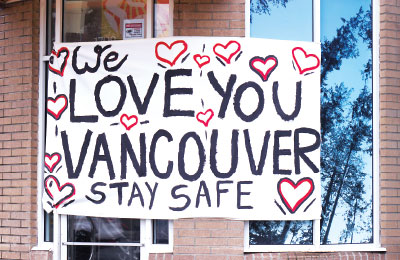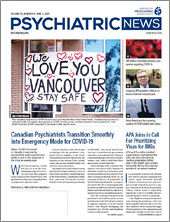With a few exceptions, Canada has not yet seen the overwhelming surge of COVID-19 cases that have plagued some regions in the United States, but psychiatrists there are doing their best to prepare for any outcomes.
Canada may have some advantages in dealing with the pandemic compared with its neighbor to the south. The population is more spread out, the response to the threat of the coronavirus came sooner, and the health care system is more systematic.
“My impression is that the provincial and territorial governments were on board faster and more consistently than in the United States,” said Renata Villela, M.D., president of Ontario District Branch of APA and a private practitioner in Thornhill. “Also, many medical services are covered here by government insurance, so people may have felt more comfortable going to the doctor for preventive care, which could then have given them a better baseline.”
The leadership of the Canadian Psychiatric Association (CPA) understood that there would be an increased need for mental health services, said CPA President Georgina Zahirney, M.D.C.M., an assistant professor of psychiatry at McGill University, Montreal. “An important role for the CPA is educating the public about the difference between mental illness and mental distress, which is a normal reaction to stressful situations.”
The CPA, working with provincial psychiatric associations, made recommendations to the federal government to upgrade capacity. As in the United States, that meant managing the expanded use of video and telephone contacts with patients.
“We were concerned about vulnerable groups—like indigenous populations, the homeless, refugees, and others—who may not have access to technology or for whom online services may not be as good as in-person work,” said Zahirney. “We have a large refugee and immigrant population here in Montreal, which creates an added hurdle because translators are now hesitant to come to the hospital.”
Discharges from psychiatric wards to make room for COVID-19 patients necessitated greater need for intensive case management and assertive community treatment, as well as more adapted housing for patients, she said. Community resources are distributed unevenly across the country, and rural areas were less equipped than cities to handle an influx of patients.
One exception was Montreal. As of early May, Quebec accounted for half of Canada’s COVID-19 cases. Half of those cases were in Montreal, especially Montreal North, home to lower income families, many of them immigrants or refugees. There were outbreaks in care facilities for the elderly in Quebec, as there were in the United States. “This is tragic and exposes weaknesses in the system,” said Zahirney.
In the neighboring province, the Ontario Telemedicine Network was already in place and had effective encryption. Villela found that it offered greater access for patients, so she transitioned the bulk of her practice to it, she said. Canada had some of the same limitations as the United States on care provided via the telephone, but the government has loosened its restrictions and now pays for those services.
“And it has worked pretty well,” said Villela. “The use of the telephone is also helpful because some patients don’t or can’t use online technology and feel that there could be more confidentiality over the phone.”
The Ontario District Branch had to cancel its spring meeting and is trying to decide whether to do a virtual meeting or hope for an in-person session in the fall, should circumstances permit. Toronto’s Frank Sommers, M.D., founding chair of the CPA’s Section of Disaster Psychiatry, transformed a June 6 seminar titled “Mental Health in the COVID-19 Pandemic” into a webinar as the pandemic advanced. The line-up includes colleagues from the University of Toronto and U.S. experts like Joshua Morganstein, M.D., and Robert Ursano, M.D., of the Department of Psychiatry and the Center for the Study of Traumatic Stress at the Uniformed Services University of the Health Sciences in Bethesda, Md. The webinar offers CME credit to both Canadian and U.S. participants.
“We have not had an overwhelming surge yet in Toronto, because we have a cooperative citizenry who can practice ‘physical distancing’ with ‘social connectedness,’ ” said Sommers.
The outbreak played out differently on Canada’s west coast, said Alan Bates, M.D., president of the British Columbia Psychiatric Association. “We were very worried at first,” he said. Nevertheless, three days after scientists posted the SARS-CoV-2 virus’s genetic code, British Columbia had testing and contact tracing in place, said Bates.
Vancouver Community Health Services—which includes public health, primary care, and home care services—held several sessions on emergency planning and practice, added Randall White, M.D., medical director of Vancouver Community Mental Health Services and president of APA’s Western Canada District Branch. However, the assumption was that an “emergency” would be a mass casualty event or a chemical spill, not a worldwide pandemic.
One key to the province’s effective response to the outbreak has been daily press conferences by Bonnie Henry, M.D., provincial health officer for British Columbia and a clinical associate professor at the University of British Columbia. Calm and reassuring on screen, Henry has become a kind of local hero, said White. Recently, Henry emphasized “fewer faces, smaller groups, shorter times together, and bigger spaces” for enjoying summer holidays.
Like many of their U.S. counterparts, Canadian psychiatrists are providing support to their colleagues in the emergency departments and intensive care units of provincial hospitals. “The provinces are well organized to support physicians, and we encourage our members to work with existing groups,” said Zahirney.
Generally, such support has come through employee assistance programs, although the University of British Columbia’s Department of Psychiatry has been recruiting volunteers to be available if needed or to help consultation-liaison psychiatrists on medical/surgical wards, said Bates.
“At the end of the day, it comes down to acknowledging the incredible work that physicians are doing across the board,” said Villela. “Mental health is often walled off and stigmatized, but physical health and mental health are intertwined. Everyone has a role. It’s all about coming together and collaborating to get the job done.” ■

